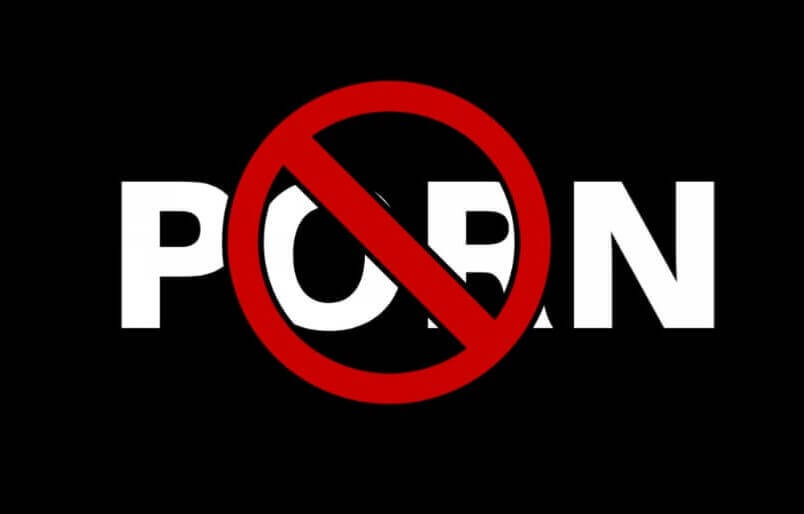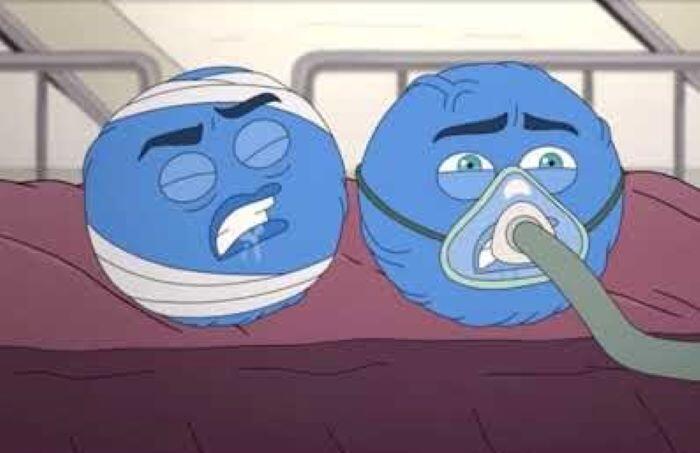
In this article, I distill the ten most important things anyone can do today to live a sustainably porn-free life. If you’ve read around on the site, you will notice that a lot of the content in this article has been curated from other posts that have been published during the last three years. Many of these ideas have been framed and repackaged endlessly because they are fundamental to getting free from a pornography habit or addiction. Once you master these, there isn’t all that much more to know and you can shift your attention to execution.
Without further ado, I present 10 commandments of porn-free living! Obey them and success is soon to follow.
1. Establish and Maintain Accountability Relationships
Given the easy accessibility of pornography on the internet, a passive approach to breaking a pornography habit or addiction is destined to fail. An active approach, on the other hand, requires establishing proactive accountability with a trusted person or persons, not merely to confess relapses after the fact, but to check in regularly during the week and to reach out for support during moments of temptation. I have been a part of churches where solid accountability was a given. In other contexts, I had to get creative. It may take effort to find an ideal accountability partner(s), but it’s a worthy priority since the success of everything else we do depends on it.
2. Install Pornography Filters and/or Accountability Software
Software like Covenant Eyes (blocks explicit content), Accountable2You (sends detailed reports of internet usage to an accountability partner), and Lion (a free accountability browser with a reporting function), are designed to eliminate temptation and increase transparency. Research the different services (Google “Best accountability software 2024â€); find an arrangement that works for you; and invest a few dollars every month to radically increase your probability for success.

The goal of reboot/recovery is to become the kind of person who doesn’t need pornography and would make the right decision in any environment. However, human nature and the ongoing pitfalls of technology make accountability and internet filtering/reporting a universal necessity.
The best way to use porn filters is part of a comprehensive approach to ending your behavior with porn and masturbation. They aren’t a waste of time, when you know that they’re not the true solution to your problem. They are simply a deterrence—a short-term deterrence.
J.K. Emezi in Are Porn Filters a Waste of Time?
3. Prioritize Social Relationships
Aristotle famously said, “Man is a social animal.” What he meant was that humans evolved to be relational. The only beings that don’t need social activity are “beasts” and “gods” (and even God in religions like Christianity is relational). The bottom line is that being anti-social and living disconnected from other people typically leads to depression, anxiety, and poor life outcomes in human beings. A pornography habit or addiction thrives in isolation (hence the term “silent epidemic” and “my dirty little secret”). On the other hand, time spent with the right people fosters connection. When our fundamental psychological need for connection is being met, we tend not to settle for toxic counterfeits.
Porn is a silent vice. Unlike smoking, drinking, gambling, or doing drugs, porn often involves no paper trail, brokerage, supply chain, or social relationships. This makes porn particularly insidious.
Cultural Quote #184: The Silent Vice
People also supply us with accountability, both directly and indirectly. There is structured accountability, which consists of routine, goal-oriented exchanges. There’s also the accountability of simply being around people on a regular basis and consciously/unconsciously not wanting to do things that create shame/damage our relationships with them.
4. Lift Weights, Do Cardio, or Stretch Regularly

Sometimes we think we need a sexual release, when, in reality, we really just need a physical one. Blue balls, or sexual frustration, is a kind of physical stress. It is an uncomfortable feeling that urges us to satisfy it, if not sexually then through some other physically gratifying activity. In general, whenever people feel bodily tension, they seek some form of release, in the form of food, drugs, or sex. In my experience, physical stress in the form of anxiety, anger, shame, etc. is fuel for the fire of lust (and other impulsive, instantly gratifying behaviors). In my experience, reliving physical stress takes a lot of the edge off blue balls. In many cases, it resolves it entirely. Weights, cardio, and stretching are the three most common forms of exercise that people use to blow off steam.
5. Go Off The Grid And Spend Time in Nature
The internet is as much a treasure trove of knowledge as it is one of lewdness and obscenity. And many temptation triggers are capable of beating content filters and accountability mechanisms. If we want to avoid temptation, it is advisable to spend less time online, especially if it’s not for an expressly productive purpose. As they say, “Idle hands are the devil’s playground.â€
Nature-deficit disorder is not a formal diagnosis, but a way to describe the psychological, physical and cognitive costs of human alienation from nature, particularly for children in their vulnerable developing years.
Richard Louv
On the other hand, nature is life-giving. It is where our ancestors spent the majority of their time. People who spend more time outdoors tend to be happier and enjoy better mental health, which fosters integrity and healthy lifestyle choices in other areas.
6. Practice Fasting, Or At Least Don’t Overconsume
In, Fasting To Break Pornography Addiction And Control Lustful Behavior, I elaborate four of the most relevant benefits of fasting as it relates to the issue of pornography: 1-) Fasting is training in self-control; 2-) Fasting in training in willpower; 3-) Fasting is an aid to processing unresolved emotions and traumas; and 4-) Fasting is a tool to build a stronger relationship with God. Check that article out if you haven’t already.
Overconsumption in one area is a threat to moderation in other areas. And moderation in one area can have a carry-over effect. Fasting is a prime example of the latter.
7. Learn From Your Relapses Instead of Self-Deprecating
Josh Hudson, founder of Pinnacle of Man, said “If you just relapsed, listen up. Stop feeling shameful. It makes you want to do one thing: isolate. Studies show that when you isolate, you become extremely stressed out. That stress builds and builds and builds and makes you want to do one thing again, go relapse. Relapse, shame, isolation, stress, relapse, all the way to your inevitable hell.”
A relapse is an opportunity to shore up weaknesses in our habits and processes. What should I have done differently this time? And, more importantly, what can I do differently next time? It may mean taking steps to proactively manage stress; changing what media I consume; who I hang out with; my physical and dietary habits; or dedicating more time to prayer and spiritual pursuits. Studying our relapses–and acting on that insight–gives us the confidence to move forward knowing that we are in a better place than we were before.
For further reading, check out What To Do After I Relapsed And Watched Pornography? (Spiritual + Secular Approaches).
8. Know Your Emotional Triggers and Heal Your Emotional Trauma
The relationship between trauma and addiction is well-documented. For example, Gabor Mate had this to say in The Relationship Between Trauma And Addiction:

In other words, the addiction wasn’t your problem. Your problem was you had a lot of emotional pain you didn’t know what to do with. So when you say, why do people use substances? Or why do people engage in addictions in general? It’s because they have a problem they don’t know what to do with.
Gabor Maté
Other common triggers that fuel a pornography habit or addiction are 1-) emotional stress (anger, fear, and shame); 2-) loneliness, and 3-) boredom.
For further reading, see Managing Emotional Triggers In The Porn Reboot/Recovery Process (Stress, Loneliness, And Boredom) & Shame Is Fuel For The Fire Of Lust (Managing Emotional Triggers).
9. Grow Your Relationship With God
Every major (and minor) religion that I know of, and every spiritual worldview centered on human flourishing, warns of the spiritual consequences of lust. It creates separation between us and other people, as we know, but it also creates separation between us and God. On the flip side, a strong relationship with God orders our perceptions and awakens us to the consequences of our actions.
I know of no other way to triumph over sin long-term than to gain a distaste for it because of a superior satisfaction in God.
John Piper
10. Have A Purpose That Involves Other People
As I mentioned in #3 above, bad habits and addictions thrive in isolation. On the flip side, they die when subject to the demands of purpose. There is only so much we will do for ourselves. Yet there is a lot more we will do when the welfare of other people we care about is at stake. Maybe we want to live porn-free so that we don’t support a cancerous industry that damages people. Or so that we can be a better friend, son, husband, wife, or member of a community. Or so that we can better help others facing similar challenges.
I had a mentor who always used to say that the more involved we got in solving other people’s problems, the less power ours have over ourselves. This is the mystery of another “P” — perspective. Self-forgetfulness as such is a foundation of mental health and an antidote to the ills of self-absorption.

